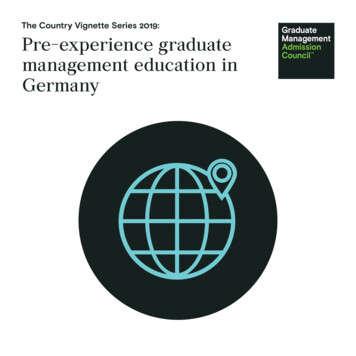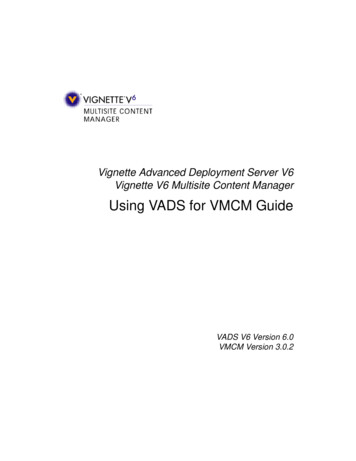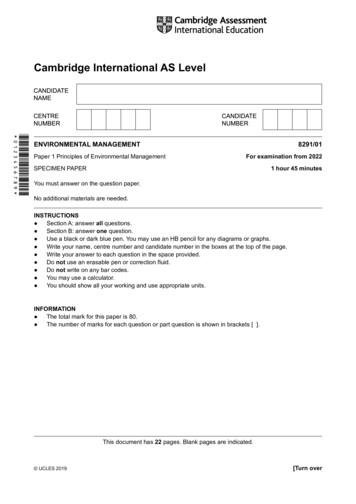
Transcription
The Country Vignette Series 2019:Pre-experience graduatemanagement education inGermany
The Country Vignette SeriesThe Country Vignette Series has been developed to illustratehow pre-experience business master’s degrees haveevolved over a 10-year period. Focusing on the supply of,and demand for, English-language taught master’s programsin a single country, each vignette combines quantitativedata— compiled from Graduate Management AdmissionCouncil (GMAC ) research on the entire market— withqualitative insights from domestic business schools.Pre-experience graduate management education in Germany1
Pre-experience graduate managementeducation in GermanyUntil relatively recently, Germany’s graduate managementeducation market was tiny when compared with itscontinental peers. While students enjoyed access to arenowned diplom system, residents of Europe’s largesteconomy overwhelmingly chose to study master’s degreesat schools in the United States and the rest of the EuropeanUnion (EU). Historically, German university educationcentered on the diplom—a long-cycle, first-degreequalification considered by many German employers to beon par with a master’s. As a result, diplom holders oftensaw no real benefit to pursuing an additional graduatebusiness degree. But today EU-wide government reformshave transformed the German education system, turning themarket for management education into a European goliath.2Graduate Management Admission Council
The expansion of Germangraduate management educationThe Bologna Accord, a series of agreements namedafter the Italian city where they were initially signed in1999, harmonized higher education across the Europeancontinent. Germany and all participating nations pledged toalign around a bachelor-master-doctoral degree structureby 2020. Diplom qualifications are therefore slowly beingphased out, and over 90 percent of programs at Germanuniversities now lead to bachelor’s and master’s qualifications.This evolution has led to new opportunities for Germany’sgraduate education market, particularly in the provision ofpre-experience master’s degrees. Data from the GraduateManagement Admission Council (GMAC ) show that thenumber of master’s programs offered by German businessschools skyrocketed by 964 percent, from 14 in 2007 to 149 in2017, with most of the growth coming from Master of Science(MSc) courses. These figures clearly show an explosion inprogram supply across Germany.Many of the master’s degrees being offered are specialized,such as the MSc in Finance. Under the German system,business schools are required to follow a structure whenestablishing new master’s degrees, but they are givenautonomy to define the curriculum. “At first, many Germanuniversities just translated their diplom degrees intobachelor’s and master’s degrees, but now they realize theyhave the chance to deep dive into specialist topics,” says Dr.Steffen Löv, assistant dean and program director of the MScdegrees at WHU, Otto Beisheim School of Management inVallendar. “10 years ago, there were 1,000 graduate programsin Germany; now there are more than 9,000,” according tothe German Academic Exchange Service (DAAD).Pre-experience graduate management education in Germany3
Employer demandPer Löv: “The Otto Beisheim School started with theMSc in Management, which has been successful. In2013, we offered the first specialized master’s degree(in finance). Later that same year we added a Master inEntrepreneurship as we see the graduate world is changing,with more students interested in becoming their ownboss.” But both student and employer interest have led tothe growth in provision of management training, he says.“Business and education have come together over the past 15years. Companies are giving us more feedback, constantly.We have advisory boards made up of business leaders whotell us what fields we should be looking into to providestudents with specialized knowledge, so they are able to getjobs upon graduation.”4Graduate Management Admission CouncilGerman businesses were initially concerned that thenew degree structure —which reduced the length of timestudents historically spent acquiring their first degreeunder the diplom structure — could reduce the qualityof recruits because they would have less time to learnthe skills they needed to perform in the workplace. Butfirms recognized that there was a growing need to bringthe professional dimension into studies. Many eventuallywarmed to business master’s degrees, as the programsfocused heavily on getting graduates workplace readythrough internships and other work placements.
The mba degreeThe MBA degree, pioneered by business schools in theUnited States, is not a strong facet of German managementeducation. “We offer the MBA, but it has always been a nicheproject in Germany,” Löv says. “The MBA isn’t as popular as itis in the United Kingdom, United States, or Spain, where it’sconsidered the flagship management degree.” Despite GMAC data showing that the number of MBA programs has grownfrom 32 in 2007 to 49 in 2017, “most German students whowant to do an MBA still go abroad. And only a small number ofcompanies with a very international focus have historicallyhired MBAs in Germany.”Pre-experience graduate management education in Germany5
Globalization and master’s degreesGerman students, enticed by master’s degrees that arerecognized by employers across Europe, have floodedinto graduate education around the world, and are alsoapplying to domestic master’s programs. In the early days ofBologna, “there was a big political discussion about why weshould abandon the diplom structure given its historicallyhigh demand for German workers like engineers,” saysLöv. “The German government expected that most studentswould leave university with a bachelor’s degree and startworking. But a bachelor’s degree wasn’t seen as equivalentto the diplom [by employers], so most students continued onto a master’s degree.”Additionally, harmonizing the higher education systemwith the rest of Europe and beyond attracted applicationsfrom a wider range of nationalities than ever before.International students’ qualifications became accepted byGerman schools, who evolved their admissions processes toadapt to a more diverse pool of master’s degree candidates.Furthermore, overseas students are attracted by Germany’swork ethos, which places a high value on job creation,customer satisfaction, and product or service quality. Onebarrier to international students is language, but plenty ofGerman business schools, many of which teach their master’sprograms in English, offer German lessons free of charge.have 35-40 percent international candidates across all ofour master’s degree programs, people from the UnitedKingdom, United States, China, Japan, and across the restof Europe. The entrepreneurial courses have the highestpopulation of domestic German students, whereas theMaster in Finance is about 60 percent international, withthe Master in Management made up of roughly one-thirdforeign students.”He continues: “Whenever we ask students why they’reinterested in studying in Germany, they always mentionthe size of the economy. They consider Germany theeconomic hub of the European Union. They want tostudy in English, too. And there are good job prospectsin Germany—lots of companies are hiring here. Also, alot of students want to come here for the low-level tuitionfees at public universities.” There are typically no tuitionfees for bachelor’s students at public universities, nor ifthese students continue to a consecutive master’s degree.Tuition fees are charged, however, for master’s degrees if astudent has studied for their bachelor’s degree at a differentinstitution. At public universities this is around 20,000 peryear, at private institutions it’s closer to 30,0001.Löv says: “When we were in the diplom phase, we hadabout 10 percent international students at the businessschool. Among our bachelor’s population, we saw similarpercentages of international students as well. But now weTop Universities. (April 24, 2019). How Much Does It Cost to Study in Germany? Retrieved [September 17, 2019] y.16Graduate Management Admission Council
Program sizeAs a result of the internationalization of German highereducation, there has not only been an increase in thenumber of master’s, but also their size. When the OttoBeisheim School of Management launched its diplom, ithad 18 students enrolled in the program. Today, there are160 students enrolled in its three key master’s programs,according to Löv. The driver has partly been the schoolitself, which has deployed strategies to expand its studentpopulation and capitalize on the Bologna Accord. Andthe Otto Beisheim School is far from alone in that respect.“More universities recognize there are not so many studentsfrom Germany anymore; they need to internationalizetheir student bodies,” Löv says. “More universities aregoing abroad and informing students about what it’s like tostudy in Germany, and they are offering more programs inEnglish. In 2000, it was rare if you could study any coursesin English at German universities, although there wereelectives taught in English. Now, there are more than 60bachelor’s programs in business taught entirely in English.At the master’s level, more than 200 programs are offered inthe English language.”Pre-experience graduate management education in Germany7
Admissions and student selectionChanges to the student population have required changesto the admissions process. German universities have alwayshad a rigorous and elaborate selection method, but asbusiness schools began to establish master’s degrees, theyneeded to adapt given the rising number of students withprior work and academic experience.Domestic and international students are generallyrecruited and admitted into German business schools inthe same way, and standardized tests are increasinglyused to evaluate candidates with varied backgrounds andexperiences. Across all German business schools, thenumber of business master’s programs using the GMAT exam has increased from five to 62 between 2007 and 2017(1,140 percent growth). “In this complex academic world,with lots of different courses and universities and types ofstudents, we need to compare them in a more standardizedway.” Löv says that the GMAT exam makes up one-fifth of anadmissions decision at the school, and as a result, attitudestoward standardized testing have changed among domesticand international applicants over the past decade: “Now itis quite common for students to be much more prepared forthe GMAT exam. They look at websites for hints and the beststrategies to get a good score.”The larger number of graduates hitting the German jobmarket has not dented employers’ appetite for talent.Companies see master’s programs as an opportunity to hirehighly educated graduates and fill their vacant positions.Löv notes a slight bias among German employers againstMBAs, who can have a harder time getting hired becauseof higher salary expectations, he says. What has changed,8Graduate Management Admission Councilhowever, are the employment sectors master’s studentsenter. While the majority go into management consultingand financial services, there is a growing trend towardentrepreneurship. “There’s a feeling that it’s easier tofound a company now than it was a decade ago; with therise of the internet,” Löv says. “Also, there’s a trend amongGerman media to promote the topic, whereas in the past,entrepreneurship wasn’t so widely accepted in the media.We also see success stories motivating people to becomeentrepreneurs. And many of our graduates work in startupsin typical management roles—finance, marketing, sales,and product management.”
Future trendsWhat will change over the next decade, Löv believes, willbe the way programs are delivered and the type of contentoffered. “I believe we will see continued growth in thenumber of master’s programs offered and the numberof specializations will increase too, with more contenttailored toward the needs of student populations. And witha growing focus on getting employed quickly and ensuringfast return on investment, we will see a rising number ofpart-time programs offered in Germany. In fact, the onlinemedium will be huge in the next decade. And in 15 years,who knows; we might all be learning via virtual reality.”Pre-experience graduate management education in Germany9
Case study: Soft skillsIncreasingly, program design at business schools inGermany is being influenced by a growing demand amongemployers for graduates who have “soft skills.” These arethe interpersonal attributes that allow someone to moreeffectively interact with others, and typically includelistening, empathy, and communication abilities. The WHU,Otto Beisheim School of Management in Vallendar focusesheavily on management science —but it says social skillsare just as important as technical abilities. WHU infusessuch skills in students via a General Studies module,focused on responsible leadership, communication skills,and intercultural competence. The module draws uponphilosophy, psychology, cultural studies, and politics. Inparticular, teaching centers on ethical dilemmas thatinfluence emotion and human decisions, including thesocietal impact of recent technological advances.Demand for soft skills is being driven by employers, whowant people who can work effectively in more diverseand globally dispersed teams. Oral communication is onesuch skill coveted by recruiters, with poor communicationand bottlenecks often cited as preventing companies fromprogressing. Adaptability is another skill that managers areincreasingly required to have, as they are expected to navigatea world of volatility, uncertainty, complexity, and ambiguity.10Graduate Management Admission CouncilThat trend is also having an impact on student selection andgraduate recruitment. Dr. Steffen Löv, assistant dean andprogram director of MSc degrees at WHU, says the schoolhas placed more emphasis on soft skills in the admissionsprocess. Standardized testing such as the GMAT examremain important for evaluating a candidate’s readiness foran academically rigorous master’s program, but the schoollooks for people who can also demonstrate presentation,communication, and collaboration abilities in additionto more easily quantifiable “hard skills.” The ability tofind employment post-graduation is also a considerationwhen recruiting students. “We believe all students whowe consider good enough to enter our programs will begood enough to get a job offer,” Löv says. “In interviews,we ask them for their personal goals. If we had someonewho would like to join our school but did not have a senseof where they wanted to end up after graduation, we arepossibly not the right place for them. We always look atemployment outcomes.”
Pre-experience graduate management education in Germany11
Appendix: Higher education in GermanyEducation in Germany is controlled by the 16 states (Länder)with the federal government playing a minor role. Incommon with other European countries, tertiary educationis offered around a binary system that differentiates betweenresearch and vocationally oriented higher education.German higher education is made up of 121 universities(Universität), 210 universities of applied sciences(Fachhochschulen), and 57 colleges of art and music. A keydifferentiation between universities and those of appliedsciences is that only universities can award doctorates. Ingeneral, universities offer a broad range of subjects whileuniversities of applied sciences offer a narrower range ofsubjects and emphasize applied research.Admission to a university or a university of applied sciencesrequires students to hold one of the following: A general certificate, the Allgemeine Hochschulreife(more commonly known as the Abitur), which gives entryto all subjects A subject-specific certificate, the FachgebundeneHochschulreife, which limits which course of study canbe entered12Graduate Management Admission CouncilIf studying for either of these certificates, students typicallyfinish secondary education at 19 years of age (dependingon the Länder). If, however, a student has studied at avocational school, they will complete secondary educationone year earlier and earn a Fachhochschulreife (widelyknown as the Fachabitur). This certificate is only acceptedfor admission to universities of applied sciences.Irrespective of the higher education institution type,students are awarded a bachelor’s degree after three yearsof study; a master’s after two years.Higher education is typically offered by public institutions(87 universities; 103 universities of applied sciences), andhence, no tuition fees are charged.
Pre-experience graduate management education in Germany13
High-level diagram of Germany's higher education14Graduate Management Admission Council
Key data pointsMarket data based on desk research20072017235414149 of which MSc4104 of which Master of55MBA3249EMBA1012Institutions offering business master’s degreesPrograms offered:All master’sGMAT usage among master’s programs in Germany20072017Master’s program using the GMAT exam652Number of GMAT scores received3366,194GermanyGermanyIndiaChinaTop five source countries for master’s xperience graduate management education in Germany15
About GMAC: The Graduate Management AdmissionCouncil (GMAC) is a global association of leadinggraduate business schools. Founded in 1953, we arecommitted to creating solutions for business schools andcandidates to better discover, evaluate, and connect witheach other. We work on behalf of the schools and thegraduate management education community, as well asguide candidates on their journey to higher education, toensure that no talent goes undiscovered.GMAC provides world-class research, professionaldevelopment opportunities, and assessments for theindustry, designed to advance the art and science ofadmissions. Owned and administered by GMAC, theGraduate Management Admission Test (GMAT ) examis the most widely used graduate business schoolassessment, recognized by more than 7,000 programsworldwide. Other GMAC assessments include theNMAT by GMAC exam, for entrance into graduateFor questions or comments regarding this vignette, pleasecontact GMAC at masters@gmac.com.management programs in India, South Africa, and thePhilippines, and the Executive Assessment, specificallydesigned for executive programs around the world. Ourflagship portal for graduate management educationresources and information, mba.com, receives six millionunique visitors a year, and features the School SearchAcknowledgementsGMAC would like to thank WHU, Otto Beisheim Schoolof Management, and GMAC staff for their contribution tothe vignette.16Graduate Management Admission Councilsearch tool and GMASS search service, matchingcandidates and business schools.GMAC is based in the United States with offices in China,India, Singapore, and the United Kingdom. To learn moreabout our work, please visit gmac.com.
2019 Graduate Management Admission Council (gmac). All rights reserved.No part of this publication may be reproduced, stored in a retrieval system, distributed or transmitted in any form by any means, electronic, mechanical, photocopying, recordingor otherwise, without the prior written permission of gmac. For permission, contact the gmac Legal Department at legal@gmac.com.GMAC , GMASS , GMAT , Graduate Management Admission Council , Graduate Management Admission Test , and NMAT by GMAC are trademarks of GMAC in the UnitedStates and other countries.
The Country Vignette Series has been developed to illustrate how pre-experience business master's degrees have evolved over a 10-year period. Focusing on the supply of, and demand for, English-language taught master's programs in a single country, each vignette combines quantitative data—compiled from Graduate Management Admission










